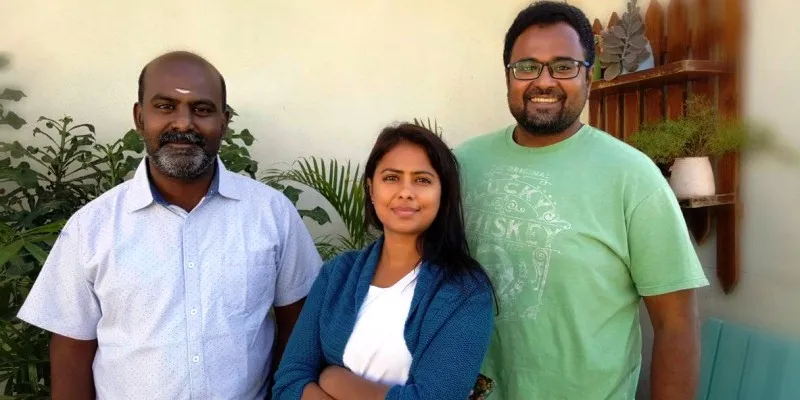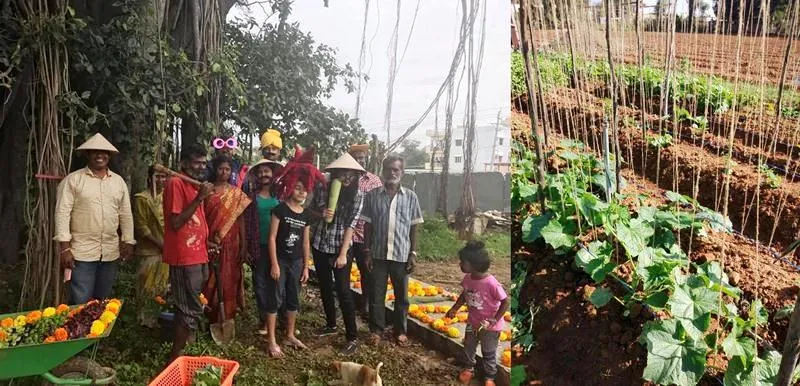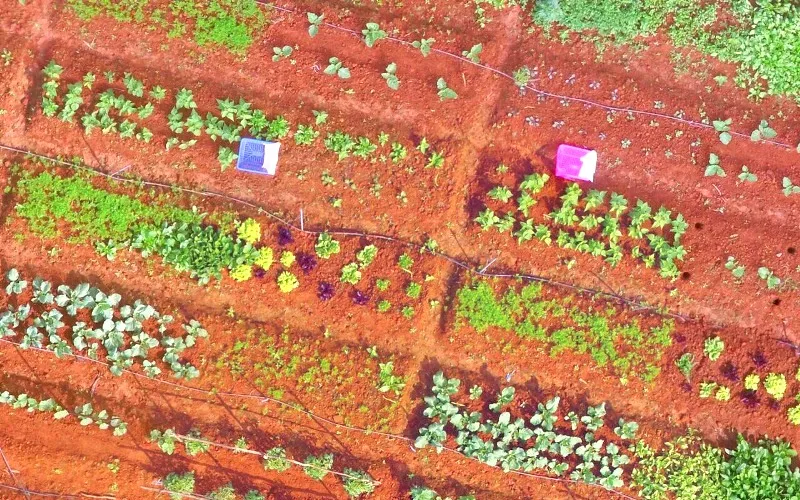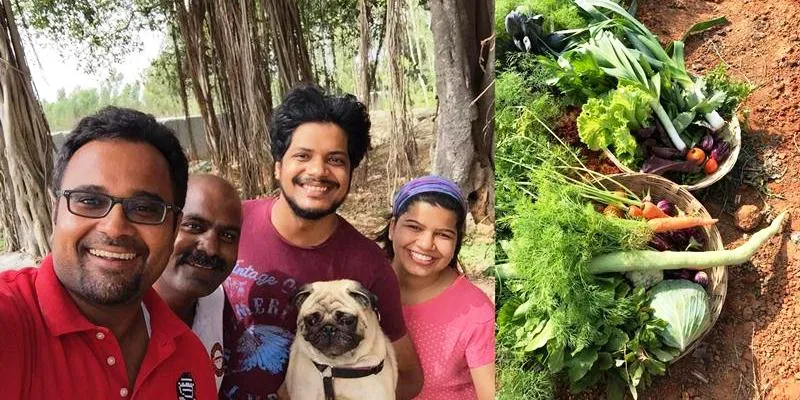This farming app lets you grow and harvest your own organic food
Farmizen is a mobile based application that enables an individual to grow chemical-free organic food in a mini-farm.

A balanced diet, having the right amount of vitamins and minerals plays a pivotal role in maintaining a healthy lifestyle.
However, modern farming techniques have done such damage that no amount of consumption of chemically-grown food is wholesome and sufficient to provide adequate nutrients to the human body.
Growing fruits and vegetables with the aid of chemical fertilisers is common and widespread, as is artificial ripening with chemicals, that depletes them of vital nutrients. Lack of transparency and traceability from the source and in the supply chain makes it almost impossible to find out if the food on our plate is safe and healthy to eat.
In an effort to combat this challenge, Shameek Chakravarty (39), Sudaakeran Balasubramanian(37) and Gitanjali Rajamani (36) founded Farmizen, a mobile-based platform that lets you grow and monitor the process of growing food on a real-time basis.
Blazing a trail
Shameek holds a Bachelor’s degree in Computer Science from BITS Pilani and a MBA from Indian School of Business (ISB). A serial entrepreneur, he started and has worked has worked with multiple startups in the past, apart from working with Amazon and Yahoo, building products and businesses in the online advertising space.
Sudaakeran, a Computer engineer from College of Engineering, Guindy is a hands-on technology leader, with past experience building large scale distributed systems at internet majors - Amazon and Yahoo and startups like Asklalia and Lexity.

Gitanjali Rajamani , an alumnus of the ISB-Goldman Sachs Women Entrepreneur programme, is the domain expert on the founding team, having built www.greenmylife.in - an urban gardening company. She has worked in business development at TCS prior to her entrepreneurial plunge, and holds a MBA in International Management.
Colleagues and friends from years, the three began by an experiment to grow their own chemical-free, food on a small patch of land for more than a year and saw that it was possible to generate a substantial amount of naturally grown vegetables from a 600 sft patch of land. The desire to expand and provide non-toxic alternatives on a larger scale led to the genesis of Farmizen in June 2017.
“We have been very worried about our broken food system - it seems like a vicious cycle which is getting worse every day - for all three stakeholders - consumers, farmers and the soil. We wanted to come up with a model which is better for everyone,” adds Shameek.
While the primary focus of the farmers remains production , Farmizen provides agro inputs, technical know-how, marketing, distribution, regulation, and monitoring facilities.
From farm to fork
Situated on the periphery of Bengaluru city, Farmizen manages five farms of 10.5 acres, divided into mini farms of 600 sq ft each. By paying Rs 2500 as a monthly subscription fee that includes the monthly rent to the farmers, the individuals can grow vegetables of their choice as per the season in the twelve beds allocated to them in their mini farm. They control the farm through an app just like Farmville and can visit the farm anytime and harvest their own chemical-free produce.

The Farmizen team ensures that the consumer knows how and what reaches from their farm to their fork and has a system of adequate checks and balances in place against any violation. The information is well substantiated with pictures and live videos of the process.
The information is substantiated with pictures and live videos of the process and has a system of adequate checks and balances in place against any violation.
A comprehensive technology stack built by them includes consumers’ app on Android and iOS, a farm management app for farmers (also available in regional languages), unmanned aerial videography using drones, image processing to identify crop growth stages for remote monitoring, a driver app for optimising delivery routes, and managing the last mile delivery.
“Technology will play a very important role in transforming agriculture in India. The core of the platform is the Farmizen brain, which understands planting regimen for various crops and is able to orchestrate the entire process, and recommend actions to farmers based on real-time inputs from the field as well pre-defined schedules for over 50 different types of crops,” explains Sudaakeran.

A win-win situation
In India, a vast majority of the food is produced by smallholder farmers, who are often debt-stricken and living in conditions of poverty . Unexpected price variations, uncertain weather conditions and the desire for a higher yield to make greater profits make them resort to using chemical fertilisers, the long-term result of which is the deteriorated quality of soil.
A fixed amount paid to farmers every month would thus incentivise the farmers to adopt the best techniques for production, instead of the most cost - effective practice. The partner farmers of Farmizen make a minimum of three times more income from their farms compared to traditional agriculture .
On the other hand , consumers get access to safe, traceable food they can trust. Every week they get fresh, locally grown seasonal food, free of chemicals - delivered directly to their doorstep or harvested by them at the farm.
“When you grow your own food, you savour it more. You eat even the vegetables you never used to touch earlier because you realise the effort it took to get it to the table. Also the vegetables taste better because we have left it to ripen on the plant. The joy of growing is something else and Farmizen enables you to discover that,” says Gitanjali.
Additionally, the soil quality improves gradually as the team follows a natural-farming methodology, relying heavily on mulching, indigenous microbe solutions, activation of local earthworms. and multi-cropping.

The road ahead
Buoyed by the success, accelerating from one farm and 79 subscribers in June 2017 to five farms and over 300 subscribers in December, the Farmizen team is intending to scale up to fifteen farms in the periphery areas of Bengaluru in the coming months and gradually reach out to other metropolitan and smaller cities , making it a pan-India movement.
Shameek concludes: “The core problems we are trying to solve - access to safe healthy chemical-free food for consumers and improved stable income for farmers - are common all across the country. So, we believe the potential market is quite huge.”
To improve the food systems, a sustainable solution has to be provided and that must be achieved in ways that benefits the livelihood of the farmers directly. In many ways, Farmizen’s target is to provide solutions to nutrition challenges, in addition to alleviating farmers’ woes.







